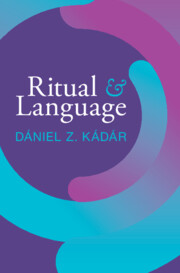Book contents
- Ritual and Language
- Ritual and Language
- Copyright page
- Contents
- Figures
- Tables
- Acknowledgements
- Foreword
- 1 Introduction
- Part I The Language of Ritual: Foundations
- Part II Ritual Frame in Interaction: The Complex Interactional Features of Ritual
- 5 Mimesis
- 6 (Self-)Display
- 7 Liminality
- Part III Methodological Issues
- Notes
- References
- Index
- References
7 - Liminality
from Part II - Ritual Frame in Interaction: The Complex Interactional Features of Ritual
Published online by Cambridge University Press: 07 March 2024
- Ritual and Language
- Ritual and Language
- Copyright page
- Contents
- Figures
- Tables
- Acknowledgements
- Foreword
- 1 Introduction
- Part I The Language of Ritual: Foundations
- Part II Ritual Frame in Interaction: The Complex Interactional Features of Ritual
- 5 Mimesis
- 6 (Self-)Display
- 7 Liminality
- Part III Methodological Issues
- Notes
- References
- Index
- References
Summary
Chapter 7 discusses liminality from a pragmatic point of view. All interactionally complex rituals take the participants through a threshold to some degree, in that the rights and obligations and related conventions of pragmatic behaviour holding for rituals tend to differ from their counterparts in ‘ordinary’ life. Yet, it is relevant to study fully-fledged liminal rituals with a sense of irreversibility. For example, ritual public apologies are liminal in the fully-fledged sense because the person who realises such ritual apologies passes a threshold with no return. Liminal rituals come together with strong metapragmatic awareness: if the moral order and the related frame of the ritual are violated, both the participants and the observers tend to become alerted and engage in intensive metapragmatic reflections. Chapter 7 will present a case study focusing on the liminal rite of workplace dismissal. Such dismissals represent typical liminal rituals in the very sense of the word: they change the life of the recipient and as such they are very meaningful and irreversible. Because of this, perceived ‘errors’ in the realisation of this ritual tends to trigger particularly intensive metapragmatic reflections and evaluations.
- Type
- Chapter
- Information
- Ritual and Language , pp. 110 - 126Publisher: Cambridge University PressPrint publication year: 2024

